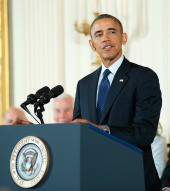Obama to unveil plan to end NSA bulk data collection
 In January, President Obama, relying on input from a presidential advisory panel, called for an end to the NSA’s bulk phone record collection.
In January, President Obama, relying on input from a presidential advisory panel, called for an end to the NSA’s bulk phone record collection.
Not that he wanted the collection stopped, mind you: he just wanted somebody besides the intelligence agency to scoop it all up.
On Tuesday, the Justice Department and the intelligence community presented Obama with a bill that would, in fact, shift bulk data collection by the NSA to the phone companies themselves.
President Obama said on Tuesday that he’s seen the proposed legislation and that it’s got legs.
According to USA Today, he made his remarks during a news conference at The Hague, where he was attending the Nuclear Security Summit.
He confirmed that officials from the Justice Department and the intelligence community had presented him with their proposal.
What he had to say about it:
They have presented me with an option that I think is workable.
According to the New York Times, the administration is preparing to unveil a legislative proposal, but the timing hasn’t been announced.
At any rate, the proposal that Obama saw on Tuesday comes in a few days earlier than the deadline of this Friday, March 28, that Obama had set back in January.
By Friday, he had wanted the Justice Department and the Office of the Director of National Intelligence to present a plan to address criticism generated by the NSA’s pervasive surveillance state since Edward Snowden first began his whistleblowing campaign.
That deadline’s significant: it coincides with the date that the current Foreign Intelligence Surveillance Court (FISC) order, which authorizes the collection program, expires.
As the New York Times reports, the proposal lassos a hodgepodge of bills being considered in Congress.
Legislators have been pondering a wide range of approaches, from minor tweaks to the current bulk-data collection program to flat-out killing it entirely.
One proposed bill, from the House Intelligence Committee, has attracted particular attention.
According to the NYT, people familiar with a draft of the legislation say that it would issue an overarching order authorizing the program but would grant the NSA the power to issue subpoenas for specific phone records without having to get a judicial thumbs-up.
By contrast, Obama wants to keep judges looking over the NSA’s shoulder.
He’s proposing that judicial authority be required to determine if agents are meeting the standard of suspicion before they get their hands on records associated with particular phone numbers.
Part of Obama’s proposal is to ask the FISC to renew the data collection program as-is for another 90-day cycle, according to senior administration officials who spoke with the NYT. Major changes to the way it works are still in the cards.
The officials told the newspaper that the new type of surveillance court order would function like this:
- Phone companies would be required to swiftly provide records in a technologically compatible data format. That includes making available, on a continuing basis, data about any new calls placed or received after the order is received.
- The orders would allow the government to swiftly seek related records for callers up to two phone calls, or “hops”, removed from the number that’s come under suspicion, even if those callers are customers of other companies. That’s part of what the presidential panel recommended in January, when it suggested both keeping data in private hands for “queries and data mining” only by court order, and also chopping the number of required hops down from three to two.
- The searches will be conducted at phone companies instead of having the NSA compile the records.
 The NSA now hangs on to phone metadata for five years.
The NSA now hangs on to phone metadata for five years.
The Obama administration had considered and then decided against requiring phone companies to hold on to customers’ calling records for longer than the 18 months already stipulated by federal regulations, given that it found that the phone companies were going to put up a battle over it.
At any rate, a senior administration official told the NYT that it didn’t much matter, given that older data is less important than fresh data.
The president’s proposal only pertains to the phone metadata collection program.
As the NYT points out, other orders for bulk data collection, such as the CIA’s orders for bulk collection of data about international money transfers handled by companies such as Western Union, weren’t addressed.
What do you think? Do you trust phone companies more than the NSA? Will Obama’s proposal change things substantially – or at all?
Please share your thoughts in the comments section below.
Image of President Obama and phone records courtesy of Shutterstock.
Article source: http://feedproxy.google.com/~r/nakedsecurity/~3/PmT5HYFxNTE/